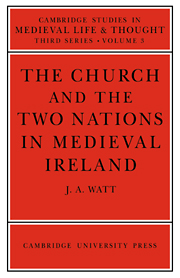Book contents
- Frontmatter
- Contents
- LIST OF MAPS
- FOREWORD
- ACKNOWLEDGMENTS
- ABBREVIATIONS
- 1 THE CHURCH IN IRELAND ON THE EVE OF THE INVASION
- 2 THE ESTABLISHMENT OF THE NEW ORDER
- 3 THE NEW ORDER CONSOLIDATED
- 4 THE CRISIS OF THE CISTERCIAN ORDER IN IRELAND
- 5 ECCLESIA HIBERNICANA
- 6 THE CLERGY AND THE COMMON LAW, 1255–91
- 7 THE CLERGY AND THE COMMON LAW, 1295–1314
- 8 THE EPISCOPATE IN THE REIGN OF EDWARD I
- 9 FOURTEENTH CENTURY DEVELOPMENTS
- 10 THE STATUTE OF KILKENNY
- APPENDIX 1 Canterbury's claim to primacy over Ireland
- APPENDIX 2 The Armagh election dispute, 1202–7
- BIBLIOGRAPHY
- INDEX
6 - THE CLERGY AND THE COMMON LAW, 1255–91
Published online by Cambridge University Press: 28 October 2009
- Frontmatter
- Contents
- LIST OF MAPS
- FOREWORD
- ACKNOWLEDGMENTS
- ABBREVIATIONS
- 1 THE CHURCH IN IRELAND ON THE EVE OF THE INVASION
- 2 THE ESTABLISHMENT OF THE NEW ORDER
- 3 THE NEW ORDER CONSOLIDATED
- 4 THE CRISIS OF THE CISTERCIAN ORDER IN IRELAND
- 5 ECCLESIA HIBERNICANA
- 6 THE CLERGY AND THE COMMON LAW, 1255–91
- 7 THE CLERGY AND THE COMMON LAW, 1295–1314
- 8 THE EPISCOPATE IN THE REIGN OF EDWARD I
- 9 FOURTEENTH CENTURY DEVELOPMENTS
- 10 THE STATUTE OF KILKENNY
- APPENDIX 1 Canterbury's claim to primacy over Ireland
- APPENDIX 2 The Armagh election dispute, 1202–7
- BIBLIOGRAPHY
- INDEX
Summary
The prelates of the ecclesia hibernicana had come to formulate their gravamina because they considered they were being denied justice. Men of the thirteenth century understood the concept of justice in the Roman definition adopted by canon and common lawyers alike, as a ius suum cuique tribuens. Prelates might be deprived of their own right in different ways. It might be because judges and officials were inefficient or corrupt, serving their own ends and not those of justice or because of the illegal actions of others or because in particular cases the operation of the law bore hardly on individuals or because the law was obscure or made no provision for the particular eventuality. It might be because the law had been changed in ways that took from the clergy what they had hitherto enjoyed unchallenged. Denial of justice, deprivation of ius suum in all these ways, was alleged in the petitions addressed to king and pope by Irish prelates in the second half of the thirteenth century. Close study of these allegations throws much light on the way the common law system affected the Irish Church.
It must be observed by way of preliminary that neither king nor pope was any stranger to complaints from the clergy about the operation of the common law. The ecclesia anglicana, thanks to the energetic leadership of Robert Grosseteste, had made its first formulation of gravamina nearly two decades before anything at all comparable appeared from the ecclesia hibernicana.
- Type
- Chapter
- Information
- The Church and the Two Nations in Medieval Ireland , pp. 120 - 135Publisher: Cambridge University PressPrint publication year: 1970



